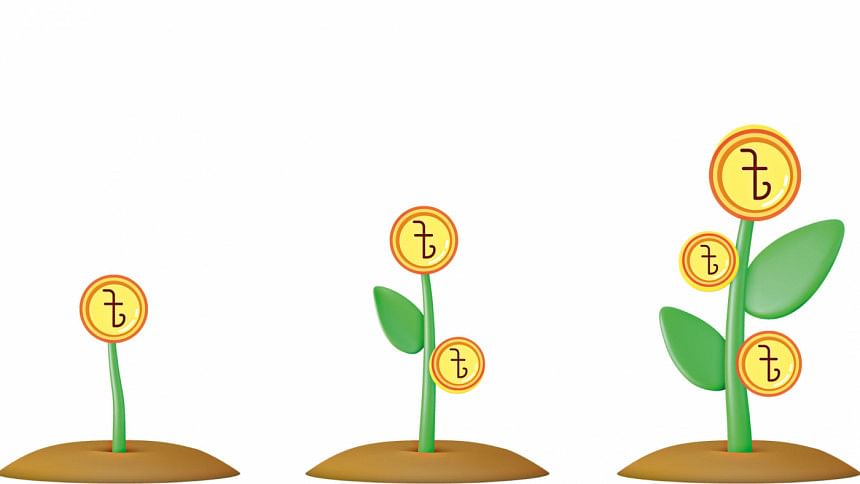Driving Green Growth

Despite its minimal contribution to climate change, Bangladesh is highly vulnerable to extreme weather events and climate variability, ranking seventh globally as the most disaster-prone country according to the Climate Risk Index 2021. It is high time to scale up sustainable finance, which is essential to withstand these challenges and ensure a sustainable future. In that pursuit, under the guidance of Bangladesh Bank, the banking sector has taken proactive measures by offering green finance loans and refinancing options for green products and projects, creating an encouraging atmosphere for greening the economy.
According to the central bank's latest report, the total amount of green finance disbursed during FY23 was BDT 126.41 billion by banks and BDT 23.58 billion by NBFIs, accounting for 5.84 percent of total term loan disbursements. The Quarterly Review Report on Sustainable Finance for January to March 2024 stated that green finance by banks stood at BDT 59.68 billion, while green finance by NBFIs amounted to BDT 12.72 billion.

Green financing, initiated by the central bank in 2009-2010, started with a BDT 2 billion fund for refinancing small and medium enterprises with just three products. Today, the number of products has expanded to 94, reflecting the gradual diversification of the sustainable finance program. Bangladesh Bank has set specific green and sustainable finance targets for each bank and NBFI, which are assessed quarterly against annual goals.
"It is our utmost responsibility to use our resources wisely so that future generations can benefit without jeopardizing their prospects. Green financing is a significant component of sustainable finance, where we place high priority on the environmental aspects of any project or product," said Imran Khan, Deputy General Manager and Head of the Sustainable Finance Department at IPDC Finance.
Some of the sectors prioritized in the green finance landscape include RMG, renewable energy, energy and resource efficiency, alternative energy, liquid and solid waste management, recycling and the manufacturing of recyclable goods, environmentally friendly brick production, green infrastructure, green agriculture, and green CMSMEs (Cottage, Micro, Small, and Medium Enterprises).
"We weren't this serious 10 to 15 years ago. What has made us more serious now is experiencing the consequences of climate change firsthand. I believe it's high time that, when financing projects, we assess their social and environmental sustainability to help protect our environment," said Fakhrul Abedin Milon, Head of CRM & SFU at Dhaka Bank.
"As of June 2024, the total disbursed amount stands at BDT 515 crore. Of this, BDT 300 crore has been allocated to the Renewable Energy and Energy & Resource Efficiency segments. Additionally, BDT 93 crore has been financed to factories for ETPs. Between BDT 50 and 60 crore has been provided for MSME green projects and biogas initiatives. Our bank consistently prioritizes green finance," stated Mynul Hossain, First Vice President, Credit Risk Management (CRM) of Bank Asia.
"Our SME and cottage finance is largely facilitated through Microfinance Institutions (MFIs), including Bangladesh Bank's Credit Guarantee Scheme (CGS) for women entrepreneurs, which provides green microloans through MFIs. We finance MFIs, which in turn channel funds into climate-friendly projects. For example, in Sylhet, known for its stone extraction, the government regulates the process to maintain the region's natural integrity. MFI financing supports efforts to discourage environmentally harmful extraction practices and encourages monitoring personnel through financial support. By financing MFIs, we ensure that funds are properly circulated and used effectively," said Sudip Saha, Head of SME at United Finance.
The central bank has made Environmental and Social Risk Rating (ESRR) mandatory for banks and NBFIs under the ESRM guidelines. During FY23, 229,592 projects were rated using the Environmental and Social Due Diligence (ESDD) checklist, with BDT 4,165 billion disbursed across 179,022 rated projects. Additionally, BDT 0.88 billion from the climate risk fund was utilized by banks and NBFIs in FY23, provided as grants.
Professor Atiur Rahman, former governor of Bangladesh Bank, discussed the importance of expanding the green fund to include heavy industries such as the garment sector. He highlighted Bangladesh's global recognition for its RMG products, underscoring the need for this broader support.
"Among the popular products on the list, we have significant exposure in the RMG and textile sectors. We provide financing at concessional or standard rates for energy-efficient and resource-efficient machinery. Our portfolio includes LEED-certified buildings, ETPs, small-scale renewable energy projects, solar mini-grids, biogas plants, hybrid cars, and environmentally friendly brick manufacturing," said Syed Mahbubur Rahman, Managing Director & CEO of Mutual Trust Bank (MTB).
According to Bangladesh Bank guidelines, annual targets are set and must be achieved quarterly. MTB has consistently surpassed these targets each quarter, demonstrating impressive performance in the Green Transformation Fund (GTF). Since 2014, the bank's portfolio in green refinancing has been substantial, covering projects like environmentally friendly brick manufacturing and LEED-certified buildings.
According to Bangladesh Bank, every bank must allocate 5 percent of its total financing to sustainable finance. "However, not all banks currently have the capacity to meet this 5 percent target, though all are making efforts. Some banks are capable of reaching 2 to 3 percent, while others can achieve 3 to 4 percent. Despite this, some banks are performing exceptionally well in this area," noted Mynul Hossain of Bank Asia.
The Sustainable Finance Program provides a sustainability rating for banks and has annually announced the ten best-performing banks and NBFIs since 2020. The introduction of the green rating system four years ago has generated significant interest among banks to be included on this list. "While the percentage of green finance can be increased in the future, it is crucial that all banks become adequately equipped to meet these requirements. If the percentage is raised prematurely, without sufficient capacity, the funds may not be utilized effectively," mentioned Fakhrul Abedin Milon of Dhaka Bank.
Bangladesh Bank offers several refinancing schemes, with the most popular being the Green Transformation Fund (GTF), available in three currencies: Euro, USD, and BDT. Other notable schemes include the Credit Guarantee Scheme (CGS) and a BDT 1,000 crore refinance scheme for green projects or initiatives.
As per the Bangladesh Bank report, disbursements from the GTF totaled USD 140.94 million across 47 projects and Euro 71.21 million across 30 projects by FY22. By June 30, 2023, BDT 1,778 million had been disbursed to five clients of four banks from the local currency GTF fund.
"Following the Rana Plaza incident, we secured $3 million from the World Bank and $300 million from Bangladesh Bank for the GTF, plus an additional $200 million from our resources. This has led to impressive results, with over 200 LEED-certified platinum and gold-rated green factories established and another 500 in progress. Out of the world's top 20 platinum-rated green factories, 18 are now in Bangladesh," said Atiur Rahman.
"BRAC Bank is a Participating Financial Institution (PFI) in major refinancing schemes of Bangladesh Bank. These include refinancing schemes for green projects as well as schemes for SMEs and other marginalized communities. We have also secured various soft loans from Development Finance Institutions (DFIs). A significant portion of these funds supports green entrepreneurs, particularly those who are climate-vulnerable and marginalized. For example, we recently received grants from the Bill and Melinda Gates Foundation for women entrepreneurship and reducing gender gaps," said Md. Sabbir Hossain, Deputy Managing Director & Chief Sustainability Officer at BRAC Bank.
In addition to the central bank, DFIs can play a pivotal role in providing low-cost green funds to commercial banks for financing green projects. At the end of FY23, Bangladesh Bank was running six refinance schemes from its own funds and six projects with assistance from JICA, AIIB, and European development partners in the CMSME sector.
"There is significant potential if green refinancing provided by Bangladesh Bank or DFIs is increased. This would encourage other banks to invest more in these initiatives, as they can benefit from higher spreads compared to other types of financing. For example, under the Bangladesh Bank Green Refinance Scheme, a bank might achieve a spread of around 4.5 percent, whereas it is challenging to achieve 2 to 3 percent with other forms of financing," said Fakhrul Abedin of Dhaka Bank. Increasing such financing, along with incentives like tax rebates, could further enhance these efforts.
Bank Asia has a credit line with IFC. "The BDT 1,000 crore Green Refinance Scheme by Bangladesh Bank has around 24 signatory banks, making them eligible to utilize these funds. While the fund is sufficient considering the current setup, the challenges lie in the rigorous processes and extensive paperwork required. To access this fund, potential borrowers must submit numerous documents, which need to be simplified," said Mynul Hossain of Bank Asia.
"Refinancing can be somewhat complex, requiring specific documentation that SMEs often find challenging to provide. However, within the SME sector, environmentally friendly initiatives like brick production, biogas, and solar mini-grids are quite popular," said Sudip Saha of United Finance.
There is immense importance in ensuring the effective utilization of refinancing schemes. Narrowing down the categories of green products for the green refinance scheme could be beneficial; broader categories may include subcategories that would enhance the effectiveness of green finance, he further adds.
"When we finance a green project, the opportunity for refinancing is currently very limited if the project fails. We need to provide more support for these initiatives through refinancing," said Fakhrul Abedin Milon of Dhaka Bank.
"Green products will not become profitable instantly; rather, they will yield returns in the long run. Since the banking sector typically invests in areas that appear more immediately profitable, all stakeholders must work together," said Lutfor Rahman, Founder & Executive Director of GreenTech Foundation Bangladesh.

 For all latest news, follow The Daily Star's Google News channel.
For all latest news, follow The Daily Star's Google News channel. 



Comments